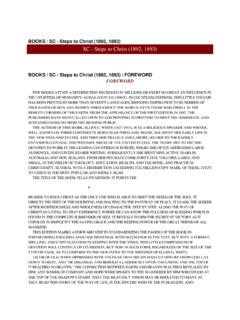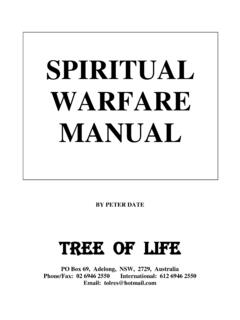Transcription of Women of the Old Testament: Women of Influence
1 Laurel Damsteegt 1 Theology of Ordination Committee 2 July 2013 3 4 Women of the Old testament : 5 Women of Influence 6 7 To summarize: in the Old testament , Women were not ordained to the 8 priesthood. This does not mean that they were not important. It just means that 9 they were not anointed to the Aaronic priesthood, or to anything, for that matter. 10 Deborah was a prophetess and called herself a mother in Israel. Jochebed 11 possibly had the most Influence of all over the Hebrew nation. Ruth and Rahab 12 were foreigners, but Providence arranged events so they could be Messiah s 13 progenitors. Hannah s prayed-for little Samuel would be a priest, prophet, and 14 judge and save the nation only because he had a praying mother. Jezebel was a 15 horrid Influence but certainly impacted Israel. Ditto for the wicked Athaliah.
2 Esther 16 saved the nation from genocide. 17 All these and many more were highly influential mothers in Israel. But we 18 reiterate: there were no Women priests, no Women elders, even though Women 19 were highly influential throughout the Old testament . 20 2 The Bible is not biased. Feminist theologians would have us believe that the 1 Scriptures were androcentric,1 that is, written with a masculine bias that excludes 2 and subverts the true picture of Women of Bible times. Because of this purported 3 disadvantage, feminist theologians look at language, anthropology of neighboring 4 civilizations, and context of story to spin fictional accounts of how Scripture would 5 differ if authored by Women . Studying customs and practices through archaeology 6 and history, they superimpose what was normative of other ancient civilizations on 7 the biblical accounts.
3 8 Women today not only rewrite biblical stories about Women , but also 9 reformulate patriarchal prayers and create feminist rituals celebrating our 10 ancestors. We rediscover in story and poetry, in drama and liturgy, in song and 11 dance, our biblical foresisters sufferings and victories.. We not only spin 12 tales about the voyages of Prisca, the missionary, or about Junia the apostle, but 13 also dance Sarah s circle and experience prophetic enthusiasm. We sing litanies 14 of praise to our foresisters and pray laments of mourning for the lost stories of 15 our 16 We believe the Scriptures are inspired. That leaves all bias and 17 androcentricity out of the realm of possibility. Speaking of the accuracy and non-18 1 Elisabeth Sch ssler Fiorenza argues in In Memory of Her: A Feminist Theological Reconstruction of Christian Origins, that feminists must employ a hermeneutics of suspicion.
4 They must assume that the Bible s male authors and interpreters deliberately covered up the role of Women in early Christianity. 2 Elisabeth Sch ssler Fiorenza, Emerging Issues in Feminist Biblical Interpretation, in Christian Feminism: Visions of a New Humanity, ed. Judith L. Weidman (San Francisco: Harper & Row, 1984), 53. 3 bias of Bible history, Ellen white says, Here only can we find a history of our 1 race, unsullied by human prejudice or human pride. 3 2 Biblical civilization is described exactly as God would have us know about it. 3 God s people with all their sinful, deviant ways were not glorified, but sins of their 4 generations were explicitly explained and condemned. 5 Scripture was given us as admonition and as history to explain to us exactly 6 how God wanted His kingdom operated.
5 Therefore to go to extra-biblical writings 7 to help us understand Scripture only confuses what the Bible (and God as 8 Author4) clearly say and mean. 9 Problems with relying on external sources and anthropologies. When Bible 10 interpreters use what is known from surrounding cultures of the Old testament to 11 fictionalize and make up their stories about Women , this can be highly problematic, 12 because a central theme of the Old testament is that God was calling His people to 13 come out from these very pagan nations. 14 God mixed up the languages to scatter the peoples of the earth because 15 heathenism was retaking the new post-flood culture. 16 God called Abraham out from Ur of the Chaldees because of the negative 17 Babylonian Influence . 18 3 ellen g .
6 white , Education, p. 173. 4 ellen g . white , Great Controversy, p. v. 4 God brought His people out of Egypt rather than allowing them just to stay 1 there and their children to become part of that civilization. 2 God wanted Israel to clean out the existing peoples already in the Promised 3 Land before settling there because He did not want them to become idolaters. 4 In short, God wanted his people to be different from the surrounding nations. 5 Therefore to use the surrounding people groups to interpret Scripture is highly 6 problematic. Yes, there may have been similarities, but those similarities may or 7 may not have been God s will at all. 8 No, we cannot take the civilizations of the ancients as normative for Israel. We 9 can learn much from the times, but cannot think we understand all about ancient 10 Israel just because a neighboring civilization does such and so.
7 We cannot conflate 11 those cultures with Israel s or God s ways of doing things. God definitely did NOT 12 want His people mixing with them or imitating them. So why should we use them 13 as normative in our interpretation of Hebrew culture?5 14 God is totally righteous and upright. His way of doing things is perfect. 15 When God tells us to do something, we are to implement it. Scripture explains how 16 God s way was not perfectly accomplished through much of biblical history, but 17 5 For an example of this type of reasoning, see The Contribution of Archaeology to the Study of Women in Biblical Times: Two Case Studies, by Jennie R. Ebeling, Review and Expositor, 106, Summer 2009. Since the Hebrew Bible provides limited information about Women s lives in ancient Israel, other sources are available that can be used to reconstruct aspects of Women s everyday activities and their roles in important lifecycle events.
8 Here Ebeling uses beer-brewing and childbirth to reconstruct the lives of Women in ancient Israel using archaeology, iconography, ethnography, and ancient Near Eastern and Egyptian textual sources. 5 His ideals and government are past questioning. Here was where Satan threw doubt 1 on God in the garden: Did God really say.. ? He held that human beings could 2 be as gods, knowing both good and evil. To cast doubt on the theocracy, patriarchy 3 or any of God s other injunctions is ultimately undermining God s authority, not 4 merely some human perception of 5 From the first war in heaven, it has been Satan s unwearied attempt to impugn 6 God s character, government, and Word. Feminist theology, based on higher-7 critical methodology, is only his latest attempt at undermining God s very essence 8 and government.
9 Scripture s purpose is to show that Jehovah is upright; He is my 9 rock, and there is no unrighteousness in him (Ps. 92:15). 10 God s Word and Way is perfect (Ps. 19:7ff), and He only leads in a righteous 11 way (Ps. 23:3). The works of his hands are faithful and just; all his precepts are 12 trustworthy; they are established forever and ever, to be performed with 13 faithfulness and uprightness (Ps. 111:7, 8, NIV). 14 6 Satan tempts men to distrust God s love and to doubt His wisdom. He is constantly seeking to excite a spirit of irreverent curiosity, a restless, inquisitive desire to penetrate the secrets of divine wisdom and power. In their efforts to search out what God has been pleased to withhold, multitudes overlook the truths which He has revealed, and which are essential to salvation.
10 Satan tempts men to disobedience by leading them to believe they are entering a wonderful field of knowledge. But this is all a deception. Elated with their ideas of progression, they are, by trampling on God s requirements, setting their feet in the path that leads to degradation and death. ellen g . white , Patriarchs and Prophets, pp. 54, 55. 6 The presupposition of Scripture is that God in His7 lovingkindness and 1 faithfulness has given trustworthy precepts and has led His people in a perfect way 2 that can be trusted forever. They cannot be second-guessed by a generation 3 infatuated with its own culture and presuppositions. Nor can we glorify God by 4 making Scripture say its own opposite through grammar or archaeological and 5 anthropological interpretations. 6 God has specific mandates regarding governance.



